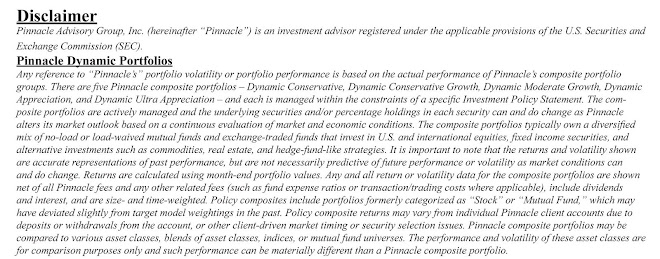In honor of our eighth anniversary of posting GIPS compliant numbers for our investment strategies (GIPS compliance meets the highest industry standards for investment performance reporting), I asked our investment analysts to think about the three biggest lessons they have learned about investing over the past eight years. I am eagerly awaiting their answers. While I’m waiting for their response I’ve been thinking of the many lessons that I have learned as CIO of our growing investment business. Since I readily admit that we have been learning on the job for eight years, and fully intend to keep learning on the job for as long as we are in the business of active and tactical asset allocation, there have been lots of lessons learned and many more still to be learned in the future. Lately I’ve been thinking about one lesson that probably deserves to be at the top, or at least near the top, of the list.
The lesson is: High conviction forecasts are extremely rare, and the corollary to this lesson is, high conviction opinions by our investment analysts should be cherished. It is only in hindsight that movements in the economy and the investment markets seem obvious. In real time, we are buffeted with competing points of view about market direction from pundits and researchers who all seem to be the smartest guys (or gals) in the room. The data itself is often conflicting. Today emerging markets are either exhibiting all of the signs of an investment bubble, or they are reasonably priced and will outperform for years to come. Bond prices are in a bubble at record low interest rates, or they are reasonable priced to reflect the deflationary economic environment of the day. Stock prices are either cheap considering forward earnings and interest rates or they are expensive considering normalized or price to peak earnings. Earnings are either overstated based on unrealistically high assumptions of economic growth or they are understated based on the consensus and wrong assumption that we are in a “new normal” period of slow economic growth. It turns out that the answers to the questions about the facts of our economic and investment lives are always in doubt. It is in our clients’ interests to be cautious as we evaluate the answers to questions about market cycles, valuation, and market psychology, and getting to high conviction about any of the answers is indeed rare…and valuable.
The corollary statement, that high conviction opinions are to be cherished, is equally true. Our investment team thrives on spirited discussions about different viewpoints about the financial markets. The analyst who combines great knowledge with a passionate point of view is likely to win the day and persuade the rest of the team. Since we are responsible for managing $800 million in assets, taking the risk that your assessment could be wrong takes a great deal of ….well…..courage. Of course, that’s what we all get paid for. At the end of the day, I continue to believe that if you want to outperform a passive benchmark you must make investment forecasts. Since we don’t have a god-like ability to perfectly predict the future, we will make investment mistakes. The best we can do is assess the probability of future events and act based on our experience, judgment, and “right-brained” intuition. We will beat the benchmarks if we make fewer mistakes than the consensus of investors. Our business is only “easy” when we have high conviction in our forecasts. I guess that’s why no one ever said this was going to be easy.

